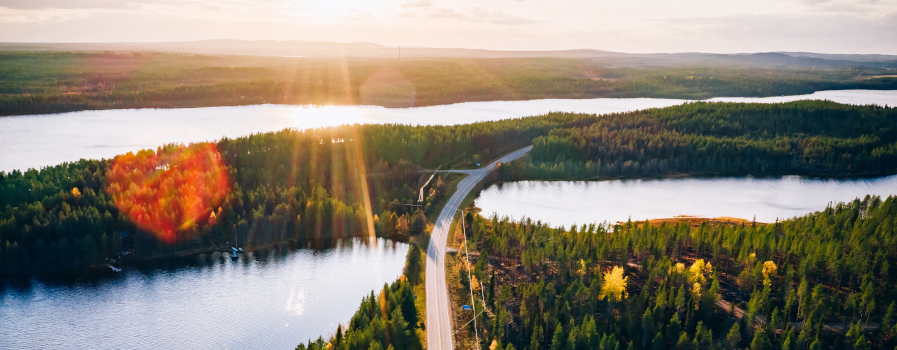Focus and priorities
- Reduced climate impact throughout the value chain
- Reduced food waste in warehouses and stores
- Transition to fossil-free goods transport
- Supplier and product requirements for reduced environmental impact from production
- Increased sales of organic and sustainability-labelled goods
- Development of packaging in line with circular principles
Key sustainability targets
- Halving food waste by 2025
- 30% reduced climate impact from customers' purchases of food by 2030
- Fossil-free goods transport by road in Sweden by 2030, in the big cities by 2025
- Science-based climate targets, with intermediate targets for 2030 and 2050
- Sustainability-certified risk raw materials in own products by 2025
- Food packaging made of plastic to be recyclable by 2025 and made of recycled/renewable raw material by 2030
Examples of activities
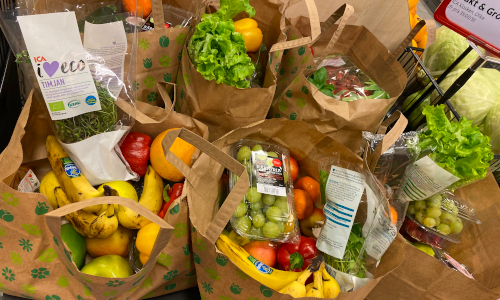
About a quarter of all food purchased is thrown away instead of consumed, and ICA Gruppen is running a number of initiatives to reduce food waste throughout the value chain. To reduce waste in ICA Gruppen's stores and warehouses, preventive work is central, through for example, better purchasing processes and registration, follow-up and cause analysis of food waste. Efforts are also being made to reduce household waste, for example by adjusting package sizes.
ICA stores are also actively working to reduce food waste. In addition to working with the right purchase volumes and assortment optimization, many stores lower the price of items that are approaching their expiration date. Some shops with kitchens also prepare ready-to-eat food or, for example, juices and smoothies from leftover products and ingredients. Many stores also collaborate with different types of charities and other actors, such as the Salvation Army, the City Mission, Food Bank and Karma, to make use of food that cannot be sold.
In Sweden, ICA collaborates with Stadsmissionen's concept for social food stores – Matmissionen. The stores sell food at greatly reduced prices from, among others, ICA Sweden's warehouses and e-commerce warehouses.
ICA Sweden also have collaborations with start-ups to, for example, use AI to reduce store waste, or provide recommendations to customers when making online purchases.
Within ICA Sweden several initiatives aim at in various ways, stimulating, inspiring and encouraging climate-smart choices. Prioritised activities include the development of an assortment with a lower carbon footprint, both through investments in completely plant-based alternatives and through launches of hybrid products, which combines animal and plant-based protein, as well as an increase in sales of fruit and vegetables. In order to promote the sale of more climate-smart alternatives different ways to influence consumers' choices in both physical stores and online are continuously being tested, for example through how goods are exposed or through communication. Innovation is central to ICA Gruppen's work for more climate-smart food choices. The use of AI enables for instance personalized recommendations in e-commerce and ICA Sweden also explores how new types of business models can be used to give climate-smart products a greater impact in stores.
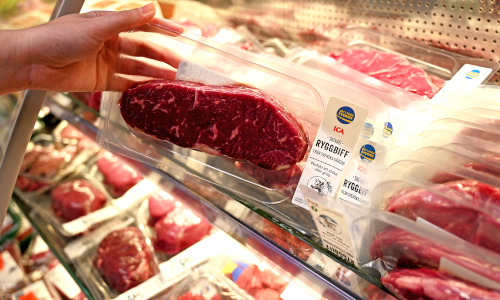
ICA Gruppen works actively and strategically with packaging, based on a holistic view of sustainability and a life cycle perspective. It means among other things that we are working to reduce the amount of plastic, to move to more renewable materials, and with packaging design that makes recycling easier.
In order to contribute to a circular and more sustainable plastics system , ICA Gruppen decided in 2018 on a Group-wide plastics strategy. In line with this, all single-use items made from fossil-based plastic have since been phased out of the central assortment. The plastic in single-use items has instead been replaced by biological materials. All plastic food packaging for ICA Gruppen's own products must be recyclable into new materials by 2025 and come from renewable or recycled raw materials by 2030.
Read more about ICA Sweden’s packaging strategy, and the work on Packaging development here ›
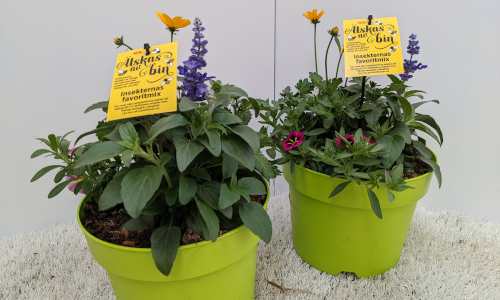
Biodiversity and healthy ecosystems are a prerequisite for life on earth, and for food production. At the same time, the production of food has a major impact on biodiversity, which is why ICA Gruppen is actively working on the issue, both in Sweden and in the global value chain.
ICA Gruppen works actively to protect and promote biodiversity through the specification of requirements for the goods it sells, collaborations to promote sustainable food production in Sweden and through ICA Real Estate's work.
ICA Gruppen's greatest impact on biodiversity comes from food production, and the risk of negative impact on biodiversity through, for example, deforestation or overfishing has therefore been an important parameter in the criteria for ICA Gruppen's risk raw materials.
In Sweden, biodiversity is threatened by, among other things, farms closing down their production, with reduced pastures and variation in the landscape as a result. ICA is therefore working actively to promote Swedish agriculture, for example through a long-standing collaboration with the Federation of Swedish Farmers (LRF), and through a high share of Swedish ingredients in ICA's private label products. Organic production has clear added values linked to biodiversity, and ICA Gruppen is therefore actively working to offer a wide range of organic and sustainability-labelled products. ICA Real Estate promotes biodiversity in all new establishments. In the construction of a new retail property in Brunnhög, work is being done on e.g. the construction of compost, the placement of dead wood, meadow grass, dry meadow carpet, solitary bees on the roofs and insect hotels.
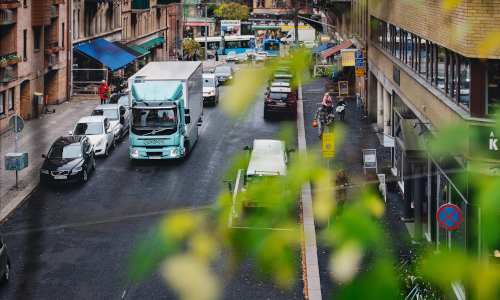
In order to reduce the climate impact of ICA Gruppen's goods transport, long-term work is being carried out that includes optimising flows between warehouses and stores, a gradual transition to renewable fuels and electrification of transport. By 2030, all goods transport by road within ICA Gruppen's Swedish companies will be fossil-free. In the major cities in Sweden (Stockholm, Gothenburg and Malmö), the transition to fossil-free transport has already been implemented, and these are fossil-free from 1 January 2025.
Partnership and innovation are central to ICA Gruppen's work for fossil-free goods transport. Since 2020, ICA has a cooperation with Volvo Trucks with the purpose of enabling electric transport solutions in Sweden, both for transport within cities and eventually also for longer distances between cities. ICA Sweden has also been one of the first companies in the world to test hydrogen-powered transport of groceries.
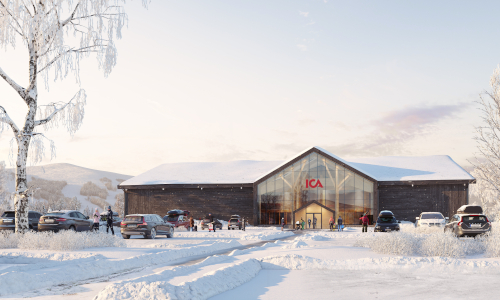
Building materials such as steel and cement have a major climate impact. Building in sustainable materials with less climate impact, and working with environmental certifications are therefore an important parts of ICA Real Estate's work to create sustainable buildings over time. We are increasingly seeing how the choice of materials is becoming more important in new construction for a reduced climate impact. ICA Real Estate has therefore made a strategic decision to choose to build the frame of a sustainable building material such as wood in new establishments to the extent that projects allow.
As a first project, where the decision could be applied and where the choice of materials had an extra strong focus, ICA Supermarket Lindvallen was therefore built. The store, which opened in 2021, was built entirely in solid wood for a reduced climate footprint, compared to the alternative with frame, wall and façade materials made of, for example, metal, concrete and paroc. The wood used for ICA Supermarket in Lindvallen was sourced from the Swedish forests of Västerbotten and Norrbotten as well as parts of Västernorrland, which resulted in shorter transports and reduced emissions. New stores have also been built in wood in e.g. Åkersberga and Östhammar.
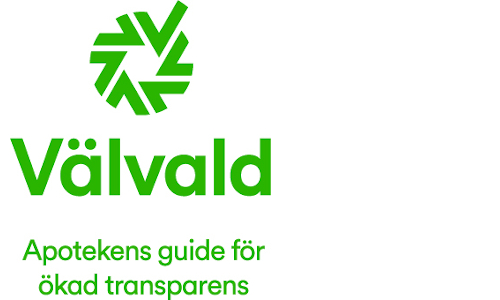
Many substances found in pharmaceuticals risk having a negative impact on the environment, but there have long been challenges in being able to follow up and influence production conditions. For a number of years, Apotek Hjärtat has been running initiatives for increased transparency and traceability in the pharmaceutical industry, including through the Välvald initiative.
Medicines contain biologically active substances and various additives such as preservatives and dyes. In the first place, it is the biologically active substances that can pose risks to the environment, as they can also have effects on animals and other living organisms. A large part of the production also takes place in developing countries, where water treatment is generally poor. So far, environmental aspects are missing from the international standard for pharmaceutical production, and transparency regarding production conditions and related emissions is relatively limited. By setting requirements for suppliers, Apotek Hjärtat works for an increased degree of openness regarding environmental considerations and the impact related to the production of pharmaceuticals.
At the beginning of 2021, all Swedish pharmacies introduced the common guide and label Välvald – for increased transparency in the pharmaceutical industry. The label is based on the guide that Apotek Hjärtat was the first pharmacy operator to produce in 2017 and the associated label Choose with Heart. In 2022, Välvald went from being a company-level guide to a product level. The criteria are regularly reviewed and made more strict, with the latest revision published in 2024.

